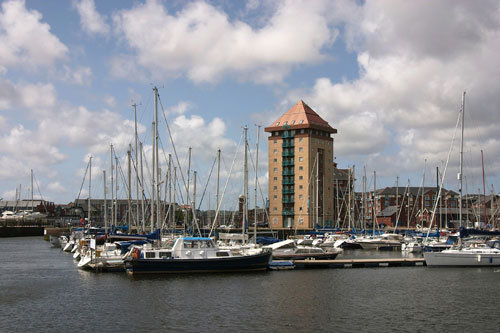
From Monty Brown's "Wales: Land of Song:" the harbor at Cardiff
The World Travel Series at SUNY Fredonia continues on Saturday, Feb. 16, with the presentation of “Wales: Land of Song” with Monty and Marsha Brown at 7:30 p.m. in King Concert Hall. This is a general admission event and tickets will be available at the door. They may also be purchased in advance through the SUNY Fredonia Ticket Office in the Williams Center (673-3501 or fredonia.edu./tickets). One child 12 and under is admitted free with each adult ticket.
Wales is a small country – about the size of Massachusetts – with its own language and a rich musical history. It is part of the United Kingdom and the island of Great Britain, bordered on the east by England. This film explores this historic land on the shore of the Irish Sea and its connection to the United States — particularly to Upstate New York.
In addition to being filmmakers, Monty and Marsha Brown are musicians, which influenced this film. The Browns describe their film as a “musical look at one of the most overlooked, yet romantic and spectacular countries of the world.”
In order to prepare for the their journey to Wales, the Browns first head to Upstate New York to meet with several people of Welsh decent who still have strong ties to their homeland. The filmmakers use this first-hand insight to map out their journey through Wales.
They make one of their initial stops in Cardiff, the capital of Wales and a city that “arrived with the industrial age and has been reshaped as a global center.” More than 18 million people visit Cardiff each year.
The city offers the Browns their first up-close look at the people of Wales, whom they describe as a “warm, genial people,” and quickly make a “host of new friends.”
In addition to music, the Browns quickly learn the Welsh people have a great love for the sport of rugby. As one local tells them, rugby is “like a religion in Wales.”
Early in the journey, the filmmakers come across another dominate aspect of the Welsh landscape – the castle. It is noted that Wales “features more castles than any other country in the world – and spectacular ones at that.”
The castles, it is noted, served a very practical purpose. While England took control of Wales in 1066 after the Norman invasion, it did not mean the Welsh were always willing subjects. Thus, the castles were built to provide stability in times of uprisings.
Heading into the Welsh countryside, the Browns discover “a land of mellifluous language, stunning scenery, three million people and ten million sheep.” Here, lush green pastures and clear running brooks are part of a landscape that appears in many ways to be unchanged by time.
The film also highlights the history of the ancient land. In one scene, the Browns head high on the moor above Oldwalls Leisure and come upon King Arthur’s Stone — which has sat relatively undisturbed for some 6,000 years.
This is a capstone weighing many tons was somehow levered up on top of several standing stones. There are great views from the stone: the beaches on the Irish Sea, the estuary and salt marshes and some scattered stone-cottage villages.
History continues to find the spotlight in “Wales: Land of Song” as the Browns visit Monmouth, the birth place of King Henry V, and Caerloen, the site where the ruins of a great Roman amphitheater were uncovered.
The history of the land is so strong that Mr. Brown notes one has the feeling of “traveling with the ghosts of Celtic warriors and coal miners.”
While the film features many images traditionally associated with Wales – from church choirs to coal mines to pastoral mountain valleys dotted with sheep – it also uncovers some that are rather unexpected.
On the south coastline, the filmmakers come across a large contingent of surfers riding the waves of the Irish Sea in a scene that would not be out of place off the shores of California.
Also on the coast of Wales, the Browns visit the site where Italian inventor Guglielmo Marconi, considered to be the father of long-range radio transmission, conducted his first wireless wave transmissions.
Monty and Marsha Brown were the recipients of the 2005 “Rising Stars” Award, given by their the Travel Adventure Cinema Society. They last appeared at Rockefeller Arts Center in October of 2008 with “La Belle France.”
The World Travel Series is sponsored by Fredonia Place as part of the 2012-13 Lake Shore Savings Season.



